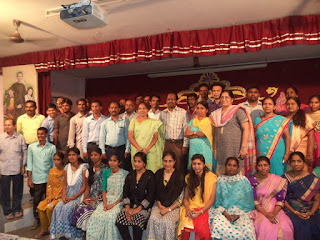by Dakshayani Madangopal
HYDERABAD, SEP 30, 2015: The Hyderabad leg of the teacher training programme on substance abuse- identification and prevention- was organised on September 25, 26 in association with Father T D John of the Don Bosco Navajeevan Rehabilitation Centre, Ramanthapur.
Over 40 participants attended the two- day programme.
In his inaugural speech, Father Sudhakar emphasised the magnitude of the problem and the need to tackle it on a war footing.
Pre-workshop forms were distributed to understand the extent of the participant's knowledge about the topic, prior to the training.
The sessions on day one began with Dr Mohan Roy, professor of psychiatry at the Medical College, Thiruvananthapuram, speaking about drugs, types of drugs, consumption behaviour and effects on human organs, tolerance and withdrawal.
He said that the average age of first consumption of liquor in Kerala is 13 years, although the legally permissible age is 18.
While talking about cannabis consumption, he said that it induced a dreamy state with a tendency to fantasize, caused perceptual and sensory distortions, restlessness, fear and even panic.
He stressed the need for more de-addiction centres and awareness programmes, while also highlighting issues with regards to 'going cold turkey' and substitution therapy.
The second day featured Swapnil Pange, psychologist and counsellor at the Tata Institute of Social Sciences, Mumbai who through a number of interesting activities covered types, reasons, signs, symptoms and consequences of substance abuse, and most importantly, the role of teachers.
Since the vulnerability to substance addiction starts at an early age, it is important to initiate talks about the ill- effects of substance abuse at a younger age at homes, as well as in schools, before it gets too late.
Protective factors such as self acceptance, supportive family, saying no to drugs, caring relationships, law abiding behaviour and avoidance of delinquent peers needs to be strengthened.
Pange also suggested that the teachers should not take up the role of a professional counsellor but instead refer the child to the school counsellor or to a professional, working with drug addiction.
Before concluding, the teachers reiterated their commitment to take the programme further to different schools.
The session ended with all the participants filling the post-training forms, following which certificates of participation were distributed.
